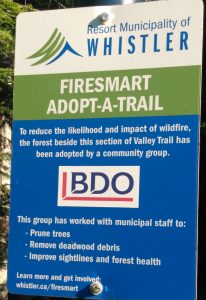
The overarching goal of this project is to enhance wildfire resilience in Whistler. We seek to do this specifically by:
i) investigating public and stakeholders’ perspectives on wildfire issues in Whistler
ii) identifying gaps in expectations of the public and wildfire risk managers and other institutional actors
iii) creating resources and forums for policy dialogue and public engagement on wildfire issues in Whistler
iv) developing a mobile phone application for public wildfire planning and management for deployment in Whistler
Background
Effective and equitable wildfire protection depends on mutually explicit expectations around the balance of rights and obligations for wildfire protection among the public, the state and all wildfire management stakeholders. Yet, academic studies and post-disaster inquiries consistently point to a disjuncture between what the public expects when it comes to wildfire security and the expectations of various wildfire management institutions. This disjuncture has not been well understood theoretically and empirically. Importantly, this disjuncture continues to hinder more effective and equitable wildfire security. This study responds to this gap in our understanding of whether, how and when the expectations of the public align (or not) with those of other wildfire management stakeholders.
Filling this gap in knowledge is particularly important in the case of Whistler, where 13000 residents, tens of thousands of non-resident workers, and 2.5 million annual tourists all contribute to its multibillion-dollar winter and summer tourist economies that depend on surrounding forest landscapes. Whistler is projected to warm by an annual average temperature of about 3°C by the 2050s compared to the recent past. This is expected to bring longer, hotter and drier summers. The risk of wildfires in Whistler continue to increase. The resort municipality of Whistler and the wider district have been taking steps to understand and manage wildfire risks in Whistler. This project will make important contributions to these ongoing efforts.
This research will produce benefits across academic, public and policy domains. It will address a significant concern in academic literature and public policy on the disjuncture in expectations of shared responsibility for wildfire security. This research will help improve wildfire security in Whistler by providing the basis for better clarification of expectations and by improving mutual understanding of wildfire protection concerns among the public and other wildfire stakeholders. By making expectations of wildfire security more explicit, this project will potentially provide opportunities for effective public engagement by revealing gaps in various stakeholders’ expectations of wildfire security. These gaps can be targeted with appropriate policy responses. The research will also develop tools, including a mobile phone application that can be used by members of the public to plan and strategize across the four phases of wildfire management: preparedness, mitigation, response and recovery. Insights from this study will find application in other contexts across British Columbia and beyond.